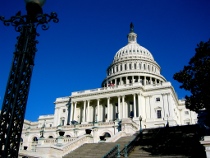The latest from the Capitol Hill’s climate bill
The timeline for bill remains uncertain while details begin to emerge.

 The US Senate continues to toil over the proposed climate change bill. The bipartisan committee of Democrat John Kerry, Republican Lindsey Graham, and independent Joe Lieberman are gradually building the framework and attempting to drum up business support for the bill.
The US Senate continues to toil over the proposed climate change bill. The bipartisan committee of Democrat John Kerry, Republican Lindsey Graham, and independent Joe Lieberman are gradually building the framework and attempting to drum up business support for the bill.
In order to pass, the bill needs support from major industries, and for that reason the representatives have asked leading lobby groups what the bill needs to include in order to meet their approval. While this may hinder the bill's ability to institute sweeping change and energy reform, it will at least ensure climate legislation is passed in the US, and provide the framework for further carbon mitigation and energy reform.
The Senate committee continues to support a scaled-back version of the "cap-and-trade" programme, now referred to as "pollution reduction targets", initially proposed by Barack Obama. The committee hopes to operate on a sector-by-sector basis with a focus on imposing carbon taxes on utilities. The reasoning is that while many large carbon emitters-such as the steel and chemical industry-can move to other countries lacking carbon legislation (thus damaging the US economy), utilities are irrevocably attached to their consumers. Energy and water utilities cannot move or outsource. It is not certain whether these scaled-back proposals will detail enough reform to meet the carbon mitigation of 20% that the US has pledged internationally.
Although carbon emissions in many heavy industries and transport will not be as stringently taxed and enforced, the bill does hope to mitigate carbon emissions in some fashion, whether by cap-and-trade or alternative methods.
And, as much as the details of the Senate's bill have increased in clarity, the uncertainty surrounding the timetable for the bill to pass remains. The most optimistic reports suggest that the bill will reach the Senate floor in as little as two-weeks, and that a vote could occur over the summer. In order for the US to carry firm weight in climate negotiations during Mexico City's COP16, the passage of this bill will be imperative.
As a leading carbon emitter and leader of the world economy, it is imperative that the US enforces strong domestic emission targets. World leaders and climate experts believe that the possibility of reaching a legally binding agreement hinges almost entirely on the US passing domestic climate legislation. Bill Clinton is supposed deliver a speech to the Senate in order to drum up support, and the White House continues to apply pressure.
Author: Michael Good | Climate Action
Image Provided by:
Elliott P. | Flickr


